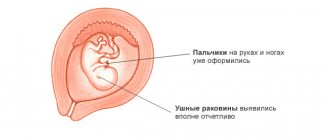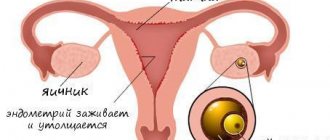Body changes and new sensations for women
At week 36, the expectant mother’s emotional sensations “slow down.” Accumulated fatigue finds expression in frequent mood swings, drowsiness and absent-mindedness. In addition, due to sitting at home for a long time and lack of work, a woman begins to invent some “horror stories” related to the birth of a baby. The only way out of this situation is childbirth. But it’s too early to rush them at 36 weeks - you will still meet your baby, but for now, be patient, there’s only a little time left! And you feel much better now, because the baby has already begun its downward movement and will soon take a comfortable place in the small pelvis, where it will remain until the moment of birth. As a result, due to the prolapse of the abdomen before childbirth, the diaphragm, which is finally not pressed by anything, has the opportunity to straighten, and the mother can breathe freely. However, for some, the stomach drops just before the birth of the baby or 2-3 days before this event.
Childbirth
Even if you notice that your stomach has dropped, this does not mean at all that labor will begin at that moment. It may take about 1-2 more weeks before labor begins. The labor activity that has now begun does not indicate pathology at all. Babies born at this time are quite viable and ready to be born.
In order for labor to begin on time, it is better to take care of yourself and not provoke labor by active actions. This also applies to sex. You need to be prepared for childbirth now, especially if you have a multiple pregnancy.
It is very important to know that positive emotions and peace of mind are very important for the normal development of the baby. Scientists have proven that during pregnancy, the joy hormones endorphins, penetrating to the fetus, convey to it a feeling of peace and harmony. Frequent experiences by a baby of such a state in the womb have a beneficial effect on the formation of his psyche. Therefore, it is very important not to worry before childbirth, since this is a natural process and any of your worries and experiences are transferred to the baby.
Mom's belly
Now a woman’s stomach may turn to stone. You should tell your doctor about your discomfort. After all, such symptoms often indicate uterine hypertonicity during pregnancy. By the way, the “culprit” of its appearance at 36 weeks may be the baby himself - despite the fact that he feels cramped in the womb, he continues to push with his arms and legs, willy-nilly provoking the muscles of the uterus to additional contractions.
What should a woman do? When discomfort occurs, doctors do not advise pregnant women to “smooth” their belly (this will only intensify the painful symptoms); it is better to lie on your side and take a few deep breaths. Doctors also recommend taking a position so that the uterus appears to be suspended - to do this, get on all fours. And do not refuse hospitalization if your attending physician insists on it.
Temperature
At 36 weeks of pregnancy, an increase in temperature to 37 degrees is normal if you feel well. But if you feel tired or have cold symptoms - cough, runny nose - you should consult a specialist to eliminate the disease.
There are special devices that allow you to monitor your child through a smartphone screen.
Cold at 36 weeks of pregnancy
Any illness at week 36 is dangerous, including colds.
What threatens you and your baby :
- high fever and cough can cause bleeding, and in the case of spasmodic coughing attacks, rupture of the amniotic sac may occur;
- colds dehydrate the body, metabolism is disrupted, and unwanted constipation appears;
- During a cold, the pressure on the placenta increases, and this is completely undesirable.
Try to spend less time in public places where there is a huge risk of contracting some disease.
Nutrition at 36 weeks of pregnancy
It happens that you don’t feel like eating at all at week 36. Loss of appetite in the later stages may be due to the fact that a large fetus “presses” on the stomach and “presses” it. Because of this, the woman feels full, although she ate just a little. Our advice: eat little but often - approximately every 3-3.5 hours. It is better to cook meat and eat it every day or two, also give up meat and fish broths (switch instead to vegetarian soups), but the amount of vegetables and fruits, as well as vegetable oil (it makes the tissues of the birth canal more elastic) is necessary increase. Don’t forget about cottage cheese, yoghurt, kefir, sour cream - at least one of these products must be present in your diet.
Many pregnant women ask the question: “Is it possible to afford watermelon in the later stages?” Doctors, as a rule, allow this fruit (if the doctor insists otherwise, it is better to refuse watermelon), but keep in mind that now the child is squeezing the bladder so that natural urges occur more often than usual. In addition, be prepared for the fact that after eating a portion of a delicious berry you will experience discomfort and a feeling of fullness in your stomach.
Low blood pressure at 37 weeks of pregnancy: what to do?
Many women and girls have problems during the wonderful and long-awaited period of waiting for a baby. Frequent dizziness, nausea, and sometimes fainting. Also, many pregnant women complain of low blood pressure.
Low blood pressure at 37 weeks of pregnancy: what to do?
This is typical not only for those who initially suffered from hypotension, but also for those who never encountered low blood pressure difficulties before pregnancy. But there are people for whom the fact of low blood pressure is normal, due to the fact that they are adapted to a certain level of arterial blood pressure and begin to feel unwell only when the pressure rises.
If expectant mothers belong to this category of people, you shouldn’t worry too much. But in other cases, low blood pressure in pregnant women causes dizziness, headaches, attacks of nausea and weakness. With a sharp decrease, even fainting is possible.
In individuals who suffer from hypotension throughout their lives, during pregnancy the condition becomes even worse, especially during the process of toxicosis, and the course of hypotension in general also worsens. The causes of hypotension are poorly understood; the main one is considered to be a violation of vascular tone. But if a woman has a tendency towards it, she needs to be examined at the pregnancy planning stage. If a woman feels great with low blood pressure, then the development of hypotension does not threaten her during pregnancy.
The main danger of low blood pressure in pregnant women is a decrease in blood flow to the placenta, as a result of which the delivery of oxygen to the fetus and essential nutrients is reduced. Poor oxygen supply to the unborn child can cause pregnancy failure, disruption of intrauterine growth and development. Individuals with hypotensive syndrome often have poor labor performance and caesarean section in such cases is a very common practice. With severe hypotension, the period after childbirth is accompanied by bleeding, and the involution of the uterus also proceeds poorly. Low blood pressure should be treated only when it affects the well-being of the pregnant woman and harms the condition of the child. But you should not rush to take medications. Unconventional treatment methods should not be used; the reaction to it in pregnant women may be different.
To begin with, any doctor will advise you to streamline your daily routine, prescribe good sleep for at least 8 hours, good nutrition, optimal physical activity for a certain stage of pregnancy and, of course, daily walks in the fresh air.
At 37 weeks of pregnancy, the fetus already looks like a newborn, and its average weight is up to three kilograms. During this period, the small resident of the abdomen is mainly in a state of sleep. The fetus moves less and less during this period, but its movements, if they occur, are very clear at this moment. You can already determine exactly what he decided to use with his hand or heel. If during the thirty-seventh week the fetus moves very often, then you should urgently consult a doctor - this could be fetal hypoxia or insufficient oxygen supply, which is very dangerous. The cause of hypoxia, as mentioned above, can be physical inactivity in a pregnant woman. Low blood pressure at 37 weeks of pregnancy exists only if the woman is hypotensive; there can be no other prerequisites for such a process.
This period in itself does not affect surges in blood pressure. By the thirty-seventh week, the stomach drops closer to the pelvis, as if preparing for the upcoming labor. In this case, the process of urination becomes more difficult, and frequent constipation also occurs. Only a quick resolution of the burden can save you from these problems. How to raise blood pressure in pregnant women has already been mentioned above. First of all, the doctor consulting the woman will advise more fresh air and the most optimal daily routine in accordance with the deadline. But if, after organizing the day, low blood pressure still bothers you and you feel unwell, special medications are prescribed.
All this happens individually. But don’t rush to turn to medication, long walks in the fresh air are truly miraculous, even in severe cases, and training loads, for example, swimming or water aerobics will be a very useful addition, and after a week a pregnant woman with low blood pressure will see the result. Normal blood pressure in pregnant women is the same as in non-pregnant women, taking into account the standard indicators, and they are known to everyone: 90 to 60 and 140 to 90. It is worth taking into account the individuality of each specific case, because normal pressure can be different for everyone.
The normal in this case is one in which the person feels great. With low blood pressure, in addition to walking and healthy physical activity, you can get by with improvised means, such as strong black tea, preferably with lemon.
Coffee can also be used as a remedy for low blood pressure, but you should not abuse it. We have analyzed how you can increase a pregnant woman’s blood pressure, so there is no need to worry if suddenly a pregnant woman is worried about its low level.
Vitamins
At week 36, the need for vitamin C increases - its lack increases the risk of premature birth. In addition, this vitamin is involved in regulating blood clotting and tissue regeneration, significantly enhances the body's defense mechanisms and is even responsible for energy production. Therefore, dear mothers, if at 36 weeks you feel overwhelmed, are afraid of getting sick and do not want to give birth ahead of time, do not forget to include rosehip tea in your diet - after all, it contains 50 times more vitamin C than lemon! But keep in mind: after drinking this tea, you need to rinse your mouth with water - otherwise you risk damaging your tooth enamel.
Prevention
It is better to prevent any problem than to treat it. Therefore, it is worth following preventive measures.
- Eat rationally, giving preference to fortified foods.
- Limit spicy, salty and smoked foods.
- To refuse from bad habits.
- Walk more in the fresh air.
- Lead an active lifestyle and do physical exercise.
- Watch your weight.
- Try to avoid stress.
- Regularly measure your blood pressure with a tonometer.
Such simple rules will help prevent adverse consequences and avoid serious problems.
High blood pressure poses a serious danger to pregnant women. Remember that it is important to monitor any abnormalities in the body’s functioning, and if symptoms of the disease appear, you should consult a doctor.
Anonymous topic author
Ekaterinburg
Good day everyone! I was very scared, the whole pregnancy my blood pressure was low 90/60, now it started to rise to 115/80, but today at 36 weeks it was 140/90 and my pulse was 57. I called the doctor and was told to drink Nifedipine and motherwort. Who had this happen?? What they were doing?
kanistra
>
Ekaterinburg
future mom
The ambulance arrived. But I felt very bad. I lost consciousness. They took urine for protein testing. It showed increased levels. They put me at risk of preeclampsia. They gave me a course of magnesium.
Murlik
Ekaterinburg
I want to become a mother
In the third trimester, I had constantly high blood pressure, and I was in pathology, and went to the day hospital, took pills, and as a result, at 36 weeks I went to a consultation and from there by ambulance to the maternity hospital, at 38 weeks I had a caesarean. But I didn’t have a sharp jump, I always had a high one and I almost didn’t notice it. You called the doctor, followed the recommendations, for now, calm down and observe; if what is prescribed does not help, then it is better to call 03.
...a kind word also pleases the cat
Rousa
Ekaterinburg
Mother
I also drank dopegit somewhere from 36 weeks, at 37,150, I called an ambulance, they took me to the Maternity Hospital and at 38 I had a caesarean section.. How are you feeling? Lie down and rest, it will return to normal) try not to worry so that your pregnancy can go smoothly) in my case, I also had to lie down and rest, but I was running around... Perhaps if I had sat straight on my butt, I would have given birth on my own at 40 weeks
S-Ulia
Mother
Murlik
I was constantly high and I almost didn’t notice it.
Likewise. They put me in pathology. They threatened to have a Caesarean if I didn’t give birth at 40 weeks. Did not have time.
Eo benefaciendo
Ekaterinburg
Mother
Since I was 36, midges appeared in my eyes, I took dopegit. My blood pressure was off the charts and my urine was very bad. I gave birth to a pretty daughter at 40)) I would donate blood and urine
MamaLena
Ekaterinburg
Mother
Only at 38-39 did it rise to 130/80 several times. The pulse was also 102. I have a big increase, but there is no protein in the urine, the swelling is not pathological. The other day, a therapist at the OPT said that it is not so much the pressure itself that is important, but the difference between working pressure and pressure during pregnancy. Those. I have a working berth of 110/70 plus hypotonic VSD. Take from 90/60 and less to 110/70. So this is a significant leap for me. Her words: “I wouldn’t take risks on your term. It's better to come to rd. They will do a CTG for you here.” And besides, if it does not decrease from dopegite, then even more so go without hesitation.
Sokel
Ekaterinburg
Mother
It also happened that at 35 weeks the pressure jumped to 160/90 (with a stable 90/60), the pulse, by the way, was 176, a pre-fainting state, as a result, intensive care, preeclampsia
Anonymous topic author
Ekaterinburg
uh...after the pill it decreased, but while 115/83 is still there, I’m trying not to do anything now so that the jump doesn’t happen, I’m sitting, lying...after my work to B...95/70, 140/90 it was hard. I drink motherwort and calm myself down
SvetlanaN
Ekaterinburg
Mother
I had it, at week 36 my blood pressure rose to 160-170, I didn’t feel it, I felt good, they put me on maintenance at twenty. They couldn’t bring down the pressure, an elderly doctor came and said: everything is fine, you’ll give birth and everything will pass. I didn’t give him any more IVs and didn’t take pills. I gave birth under an epidural, there was a pressure measuring device on my arm, and a device on my stomach to monitor the baby. She gave birth to a nice healthy little boy (soon 10 years old). I gave birth in the afternoon, the next morning my blood pressure was 120/60, and so it is to this day. We are all different, and the reasons for high blood pressure are different. I wish you health, an easy birth and a strong healthy baby.
Bun with poppy seeds
just a visitor
I had it starting at 32 weeks. I drank handfuls of the same Nifedipine, droppers with pure magnesium. It didn’t help, the pressure couldn’t be reduced. At 35 weeks there is protein in the urine. At 36 weeks they had a caesarean with a pressure of 170 to 151, I think. The girl is healthy, but not overweight.











